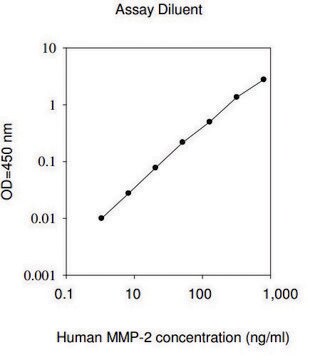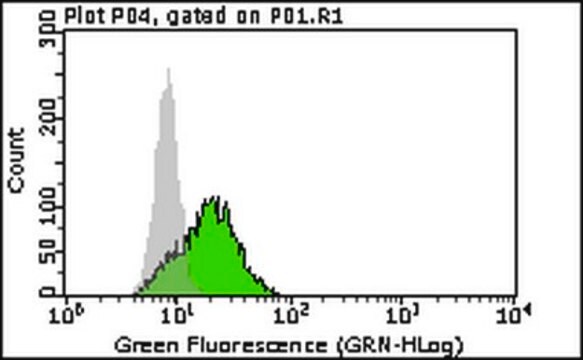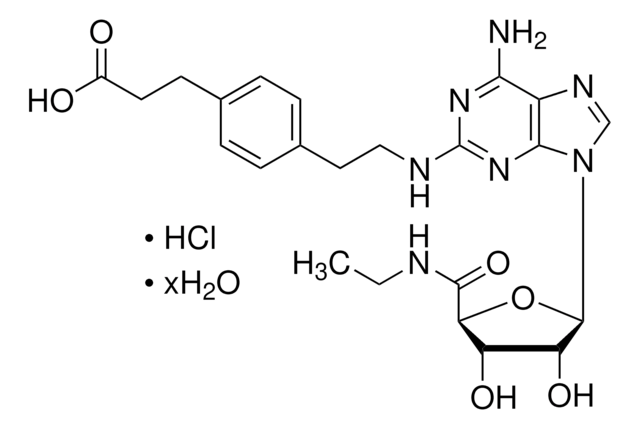추천 제품
생물학적 소스
human
Quality Level
형태
liquid
제조업체/상표
Chemicon®
농도
0.2 μg/μL
NCBI 수납 번호
UniProt 수납 번호
배송 상태
dry ice
유전자 정보
human ... MMP14(4323)
일반 설명
BACKGROUND: Matrix metalloproteinases (MMPs) are Zn2+- and Ca2+-dependent endopeptidases which function in the turnover of extracellular matrix components [Matrisian, 1992]. Presently, eighteen secreted MMPs and five membrane-type MMPs [Sato et al., 1994; Will & Hinzmann, 1995; Takino et al., 1995; Puente et al., 1996] are known to be expressed in vertebrates. Human MT1-MMP consists of 559 amino acid residues with a calculated Mr of 63516 [Sato et al., 1994; Will & Hinzmann, 1995]. The following domains and sequence regions are distinguished in MT1-MMP: Prodomain (Ser1-Arg88), catalytic domain (Tyr89-Gly261), junction between catalytic domain and hemopexin domain (Gly262-Gly292), hemopexin-like domain (Pro293-Cys485) and C-terminal sequence (Pro486-Val559) with transmembrane segment. A soluble form of MT1-MMP without transmembrane segment has been found in culture medium of a breast carcinoma cell line [Imai et al., 1996].
MT1-MMP is expressed in adult lung, placenta, kidney, ovaries, intestine, prostate and spleen [Will & Hinzmann, 1995]. Increased amounts of the enzyme are found in tumor tissues such as lung carcinoma [Butler et al., 1998], gastric carcinoma [Nomura et al., 1995], breast, head and neck carcinoma [Okada et al., 1995].
MT1-MMP is activated by removal of its prodomain. The reaction is catalyzed by furin, a subtilysin-type serine protease, which recognizes a motif of four basic amino acid residues located between the prodomain and catalytic domain [Pei & Weiss, 1996].
MT1-MMP activates progelatinase A [Sato et al., Strongin et al., 1995; Will et al., 1996] and procollagenase-3 [Knauper et al., 1996] by proteolytic cleavage of their domains. The ability of MT1-MMP to activate other matrix metalloproteinases provides potential for enhanced pericellular proteolysis in physiological and pathological processes. In particular, activation of progelatinase A by MT1-MMP is considered to contribute to local degradation of extracellular matrix during cell migration and proliferation. MT1-MMP also hydrolyzes fibrillar collagens I, II and III into characteristic ¾ and ¼ fragments [D′Ortho et al., 1997; Ohuci et al., 1997] and it cleaves a number of other ECM proteins, including fibronectin, vitronectin, laminin-1 and dermatan sulfate proteoglycan [D′Ortho et al., 1997; Pei & Weiss, 1996; Ohuci et al., 1997]. The activity of MT1-MMP is poorly inhibited by TIMP-1 but efficiently inhibited by TIMP-2 and TIMP-3 [Will et al., 1996].
MT1-MMP is expressed in adult lung, placenta, kidney, ovaries, intestine, prostate and spleen [Will & Hinzmann, 1995]. Increased amounts of the enzyme are found in tumor tissues such as lung carcinoma [Butler et al., 1998], gastric carcinoma [Nomura et al., 1995], breast, head and neck carcinoma [Okada et al., 1995].
MT1-MMP is activated by removal of its prodomain. The reaction is catalyzed by furin, a subtilysin-type serine protease, which recognizes a motif of four basic amino acid residues located between the prodomain and catalytic domain [Pei & Weiss, 1996].
MT1-MMP activates progelatinase A [Sato et al., Strongin et al., 1995; Will et al., 1996] and procollagenase-3 [Knauper et al., 1996] by proteolytic cleavage of their domains. The ability of MT1-MMP to activate other matrix metalloproteinases provides potential for enhanced pericellular proteolysis in physiological and pathological processes. In particular, activation of progelatinase A by MT1-MMP is considered to contribute to local degradation of extracellular matrix during cell migration and proliferation. MT1-MMP also hydrolyzes fibrillar collagens I, II and III into characteristic ¾ and ¼ fragments [D′Ortho et al., 1997; Ohuci et al., 1997] and it cleaves a number of other ECM proteins, including fibronectin, vitronectin, laminin-1 and dermatan sulfate proteoglycan [D′Ortho et al., 1997; Pei & Weiss, 1996; Ohuci et al., 1997]. The activity of MT1-MMP is poorly inhibited by TIMP-1 but efficiently inhibited by TIMP-2 and TIMP-3 [Will et al., 1996].
CC1043 is a recombinant polypeptide sequence produced as a periplasmic protein in E. coli. The proenzyme consists of MT1-MMP residues corresponding to Ser1-Val501 followed by tone Thr-residue and six His-residues. The calculated Mr of the recombinant soluble proenzyme is 58200 Da.
애플리케이션
Useful as an antigen standard in immunoassays. The proenzyme can be activated with trace amounts of MT1-MMP catalytic domain (D′Ortho et al., 1997; Butler et al., 1998).
물리적 형태
Provided as a liquid in 50 mM Tris-HCl, pH 7.5, 150 mM NaCl, 5 mM CaCl2.
저장 및 안정성
Maintain frozen at -70°C in undiluted aliquots. The enzyme may be stored at -20°C for several weeks. Repeated freezing and thawing should be avoided
분석 메모
Appears as a predominant band at 58 kDa in SDS-PAGE
법적 정보
CHEMICON is a registered trademark of Merck KGaA, Darmstadt, Germany
면책조항
Unless otherwise stated in our catalog or other company documentation accompanying the product(s), our products are intended for research use only and are not to be used for any other purpose, which includes but is not limited to, unauthorized commercial uses, in vitro diagnostic uses, ex vivo or in vivo therapeutic uses or any type of consumption or application to humans or animals.
Storage Class Code
12 - Non Combustible Liquids
WGK
WGK 1
Flash Point (°F)
Not applicable
Flash Point (°C)
Not applicable
시험 성적서(COA)
제품의 로트/배치 번호를 입력하여 시험 성적서(COA)을 검색하십시오. 로트 및 배치 번호는 제품 라벨에 있는 ‘로트’ 또는 ‘배치’라는 용어 뒤에서 찾을 수 있습니다.
H Will et al.
The Journal of biological chemistry, 271(29), 17119-17123 (1996-07-19)
It has been proposed that the cell-mediated activation of progelatinase A requires binding of the C-terminal domain of the proenzyme to a membrane-associated complex of the membrane type matrix metalloproteinase MT1-MMP and TIMP-2. Subsequent sequential proteolysis of the propeptide by
H Sato et al.
Nature, 370(6484), 61-65 (1994-07-07)
Gelatinase A (type-IV collagenase; M(r) 72,000) is produced by tumour stroma cells and is believed to be crucial for their invasion and metastasis, acting by degrading extracellular matrix macro-molecules such as type IV collagen. An inactive precursor of gelatinase A
Membrane type 1 matrix metalloproteinase digests interstitial collagens and other extracellular matrix macromolecules.
Ohuchi, E, et al.
The Journal of Biological Chemistry, 272, 2446-2451 (1997)
Cardiac restricted overexpression of membrane type-1 matrix metalloproteinase causes adverse myocardial remodeling following myocardial infarction.
Spinale, FG; Mukherjee, R; Zavadzkas, JA; Koval, CN; Bouges, S; Stroud, RE; Dobrucki et al.
The Journal of Biological Chemistry null
Lisa M Hodgkinson et al.
Investigative ophthalmology & visual science, 48(9), 4192-4199 (2007-08-29)
Matrix metalloproteinases (MMPs) and the tissue inhibitors of the MMPs (TIMPs) have been implicated in lens differentiation, growth, remodeling, and cataract. Hence, a gene expression analysis was undertaken in epithelial and fiber cells dissected from clear human donor lenses. The
자사의 과학자팀은 생명 과학, 재료 과학, 화학 합성, 크로마토그래피, 분석 및 기타 많은 영역을 포함한 모든 과학 분야에 경험이 있습니다..
고객지원팀으로 연락바랍니다.






